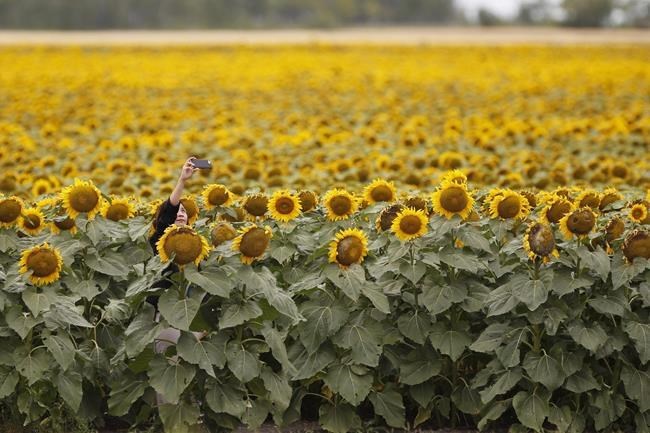The lockdown induced by the COVID-19 pandemic seems to have left a lot of people feeling caged, and as many reach out to their feathered friends for company, demand for sunflower seeds is rising.
Daryl Rex of the Manitoba Crop Alliance noted the demand for sunflower birdseed has soared by about 10 to 15 per cent this year.
"Seems like with COVID, people are staying at home and feeding birds more," Rex said in an interview Friday.
Along with that increased demand has come an increase in prices, he said, as well as a growth in the crop's footprint in Manitoba.
The price of sunflower seeds has increased by about 10 to 15 cents per pound, from an average of about 25 cents per pound to as much as 40 cents, Rex said.
For the past three or four years, he said the area for planting sunflowers had been around 200 to 245 square kilometres, but this year that increased to about 365.
Ben Friesen, purchasing manager for sunflowers at the grain supplier Scoular Canada, said farmers were asked to increase planting of sunflowers by about 10 per cent or "probably a little bit more" this year to meet the heightened demand.
Most of the calculation for how much area is devoted to sunflowers is done in November and December, he said.
"The supply last year was run right down. There was no stocks left," he said. "So, then we as buyers were encouraging farmers to grow more sunflowers."
As demand went up in the early months of the lockdown, however, he said farmers increased their plantings even further.
"Going into April-May when the farmers were still just planting we saw the increase already starting at that time. So then, maybe late in the season as late as May, some of the farmers made some last-minute changes and ended up planting sunflowers instead of some of the crops that they might have otherwise."
While the demand for the confectionery sunflowers — those that are roasted and eaten or put in candy bars — has remained "fairly stable," Friesen said, the sale of birdseed has soared.
Sunflower seeds for birds are smaller while those used in confectionery are larger with grey stripes, Friesen said.
Canada is the world's 13th largest exporter and 25th largest producer of sunflower seeds, according to the federal government's agriculture website. Manitoba is the nation's largest producer of sunflower seed, according to the province's website.
As for what's causing the increased demand, Graham Sorenson, the B.C. projects co-ordinator for the non-profit Birds Canada, said his organization has seen an extraordinary surge in interest from backyard birders and new birdwatchers in recent months.
Most migratory birds start returning to Vancouver in April, he said. And it was probably during April and May when a lot of people began realizing the presence of these feathered creatures as they were spending more time at home.
Some of the questions the organization has been getting from new birdwatchers include how to get started and connect with other birders, he said.
One of the main things Birds Canada does, Sorenson said, is to point people to resources such as the Cornell Lab of Ornithology.
He believes birdwatching will continue to soar as a hobby even after the pandemic winds down or even comes to some kind of stop.
Friesen, the grain seller, said most farmers and sellers also believe the demand for birdseed will continue next year.
Sorenson described birdwatching as being part of something bigger than yourself.
"You can be in your home seeing birds that might breed here year round, or some birds that have travelled up to the boreal forest, and they're coming back through your lawn and eating food out of your lawn," he said.
"And then they're gonna travel south to Central America or to South America. And so, this kind of feeling of being part of something really big ... migration and big travel of many, many birds is really cool and really special."
This report by The Canadian Press was first published Aug. 29, 2020.
Hina Alam, The Canadian Press

